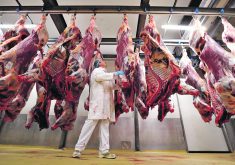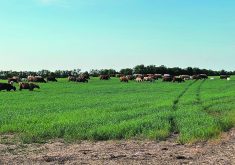In the short term, the Brexit means Canada-U.K. and Canada-EU trade could be disrupted by currency volatility.
In the long run, it’s hard to say what will happen, but free trade with Europe now seems much less likely than it did two days ago.
Those are some of the quick conclusions of Sylvain Charlebois, the dean of management and an expert in food processing economics at Dalhousie University.
“The currency game will have a huge impact on how we sell our goods to Europe,” said Charlebois.
Read Also

VIDEO: Claas Axion 9.450 tractor wins ‘Tractor of the Year’ at Agritechnica 2025
On opening day of Agritechnica 2025, Claas’ Axion 9.450 Terra Trac tractor was awarded ‘Tractor of the Year’ for 2026 in the HighPower category.
On June 23, British citizens voted to leave the European Union rather than remain inside and further integrate into the nascent super state.
More WP CETA coverage:
- ‘600 million opportunity’ awaits cattle sector
- Bison seen as biggest benefactor
- Doors may open but welcome mat takes time
- Dairy sector leery of EU trade
- Will EU trade reap benefits for all?
- Niche growers hope CETA will resolve GM issues
- CETA not silver bullet for European trade
- Ports eager to play role as markets open
- Exporters must understand unique issues of EU buyers
- Port official follows motto: if you do it, do it right
- Pork sector expects trade benefits
- Navigating the trade waters
World stock markets plunged immediately and currency exchange rates went wild with investors fleeing the British pound and secondary currencies like the Canadian dollar, and running to the “safe haven” currencies of the U.S. dollar and Japanese yen.
Gold soared, silver rose, oil fell and investors also moved into utility stocks to ride out the carnage.
The currency volatility has a big impact on the ability of countries to buy imported goods, most of which are based on U.S. dollar terms.
Britain’s plunging currency, if that weakness lasts, means the U.K. will have trouble paying for imported goods because they will become more expensive. If the Canadian dollar falls less than the pound, the prices of Canadian crops, meat and processed foods will appear more expensive.
But much bigger than nearby currency volatility is the issue of Canada’s pending free trade deal with the EU, called the Comprehensive Economic and Trade Agreement, which needs to be approved by that bloc’s parliaments. With the U.K. leaving the EU, the deal might get backburnered.
“There’s lots of uncertainty around the CETA now,” said Charlebois.
“I suspect that if CETA is to survive, some terms will need to be revisited.”
Not only will revising CETA not be a top priority for European politicians dealing with Brexit, Charlebois said, but some within the union might not want to proceed with it at all.
Charlebois said the U.S.-EU free trade talks are now much more likely to go nowhere, since those were far behind Canada’s.
Contact ed.white@producer.com
















